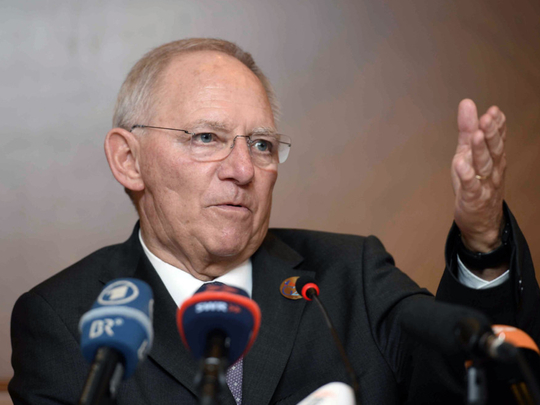
We have all been there. Two members of a circle of friends fall out over money. Neither can see the other’s point of view. Miscommunication causes friction. Suddenly, years of camaraderie threaten to disintegrate. At which point, it is up to the rest of the gang to build bridges by taking the chief antagonist to one side and having a quiet word.
Last Thursday’s astonishing sequence of events — Greece requesting a six-month extension and the European Union (EU) declaring that a basis for negotiation, only for the German finance ministry to trash the idea as a “Trojan horse” — is unbecoming of a project as grand as the euro, especially at such a critical juncture. It does not help that much of what passes for negotiation is being conducted via leaks, tweets and insults.
Germany’s peers need to remind Finance Minister Wolfgang Schaeuble that they, too, have skin in the game. Germany may have the loudest voice in the euro project and have paid the most into the bailout package currently keeping Greece afloat. But that does not give it exclusive rights to play the bouncer at Europe’s party.
Both Greece and Germany share blame for the current mess. Greek politicians have been utterly naive in playing to their domestic gallery, at times acting as if they were still campaigning in a local election. Germany, though, does not seem to have budged one inch in its demands that the new administration effectively abandon its election promises. Germany has “reached a point where they will tell Greece ‘if you really want to leave, leave’”, “Malta’s Finance Minister, Edward Scicluna, said last Friday. Other, perhaps cooler, heads in the euro group need to take control — and fast.
More and more people are starting to talk about capital controls as the only way to stanch the Greek banking system’s bleeding of cash. “If you don’t have a solution until the end of next week, I think the next step will have to be capital controls,” Marcel Fratzscher, head of the DIW economic institute in Berlin, said last Thursday. The FAZ newspaper reported last Thursday that the European Central Bank (ECB), which has increased its funding of Greek banks to 68.3 billion euros (Dh283.66 billion), favours capital controls; the ECB denied any such discussion took place. The ECB is also planning to tell Greek banks to trim their domestic government bond holdings as a safety measure if talks break down, Bloomberg News reported last Friday. And according to Der Spiegel magazine, the ECB is already running models on what the impact of Grexit would be.
The ECB’s war gaming risks being a self-fulfilling prophecy. Unfortunately, it is what the present situation demands. Europe needs to entertain scenarios encompassing everything from capital controls to nationalising the banking system to turning off the money taps and seeing if the finance sector implodes. Preparing for the worst is a sensible precaution as the euro crisis approaches its own version of the Lehman moment, when the 2008 collapse of Lehman Brothers signalled that the credit crunch could inflict an existential trauma on global finance. Capital controls, though, would be an admission of defeat by the Greek government, which would likely prefer to quit the euro than traumatize its citizens by locking the doors of its banks.
When the euro region’s finance ministers gather later Friday, countries other than Germany need to make themselves heard with ideas for reconciling Greece’s democratic mandate for change with the integrity of the existing bailout rules. It is probably too much to hope for a Musketeer spirit of “all for one and one for all”. But the fact that the current impasse risks fracturing the euro irreparably by driving Greece out of the project — with entirely unpredictable consequences for the rest of the bloc — should help concentrate their minds.
Valery Giscard d’Estaing, a former French president and one of the key architects of Europe’s grand unification project, says Greece needs to leave the euro because its economy needs a weaker currency to recuperate. “The fundamental question is, can the Greek economy get going again and prosper with a currency as strong as the euro?” he said in an interview this week with French newspaper Les Echos. “The response is clearly negative.”
He may be correct. But that is something for Greece to decide for itself, not for its colleagues to impose, and certainly not for Germany to dictate.
— Washington Post
Mark Gilbert is a Bloomberg View columnist and a member of the Bloomberg View editorial board.










